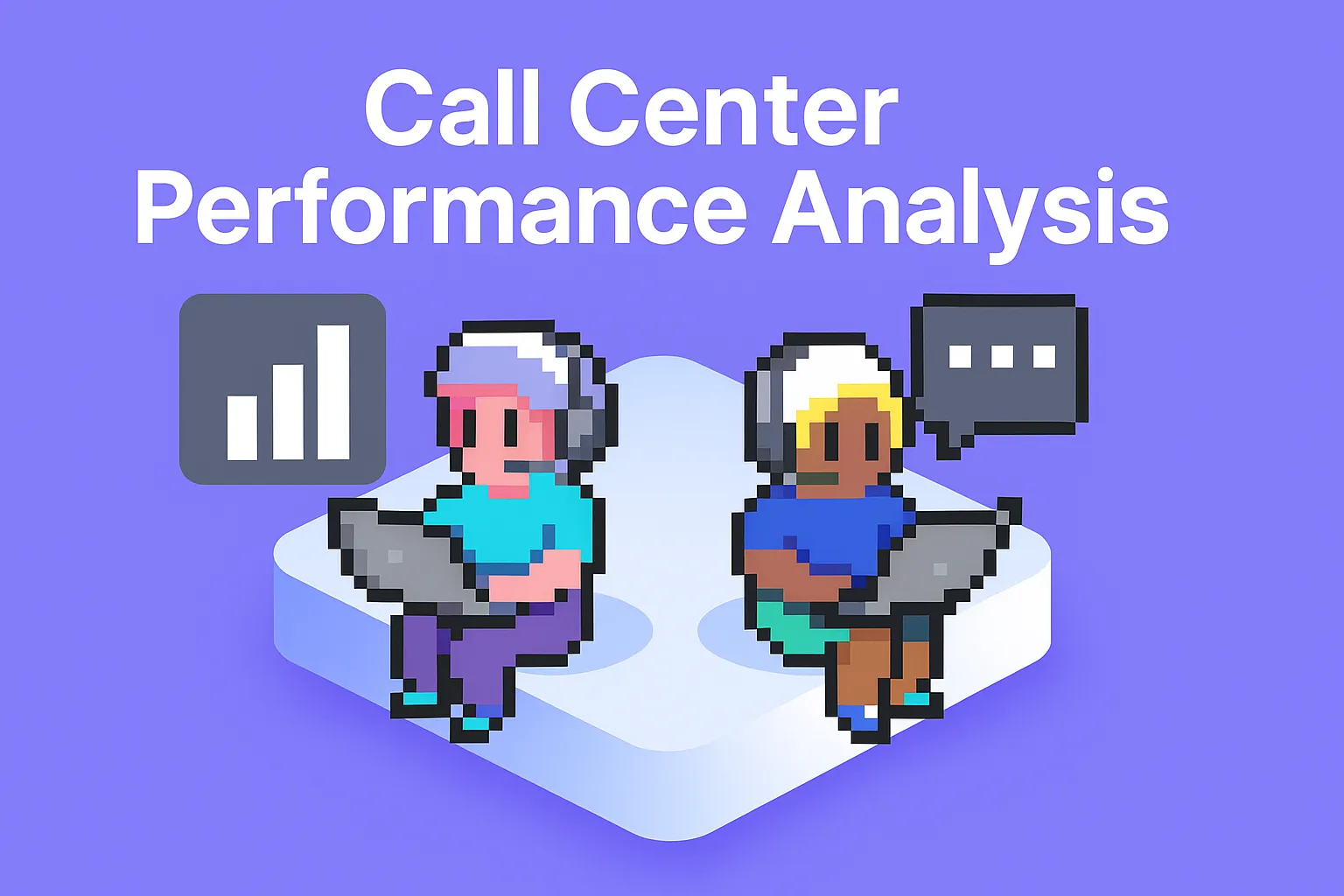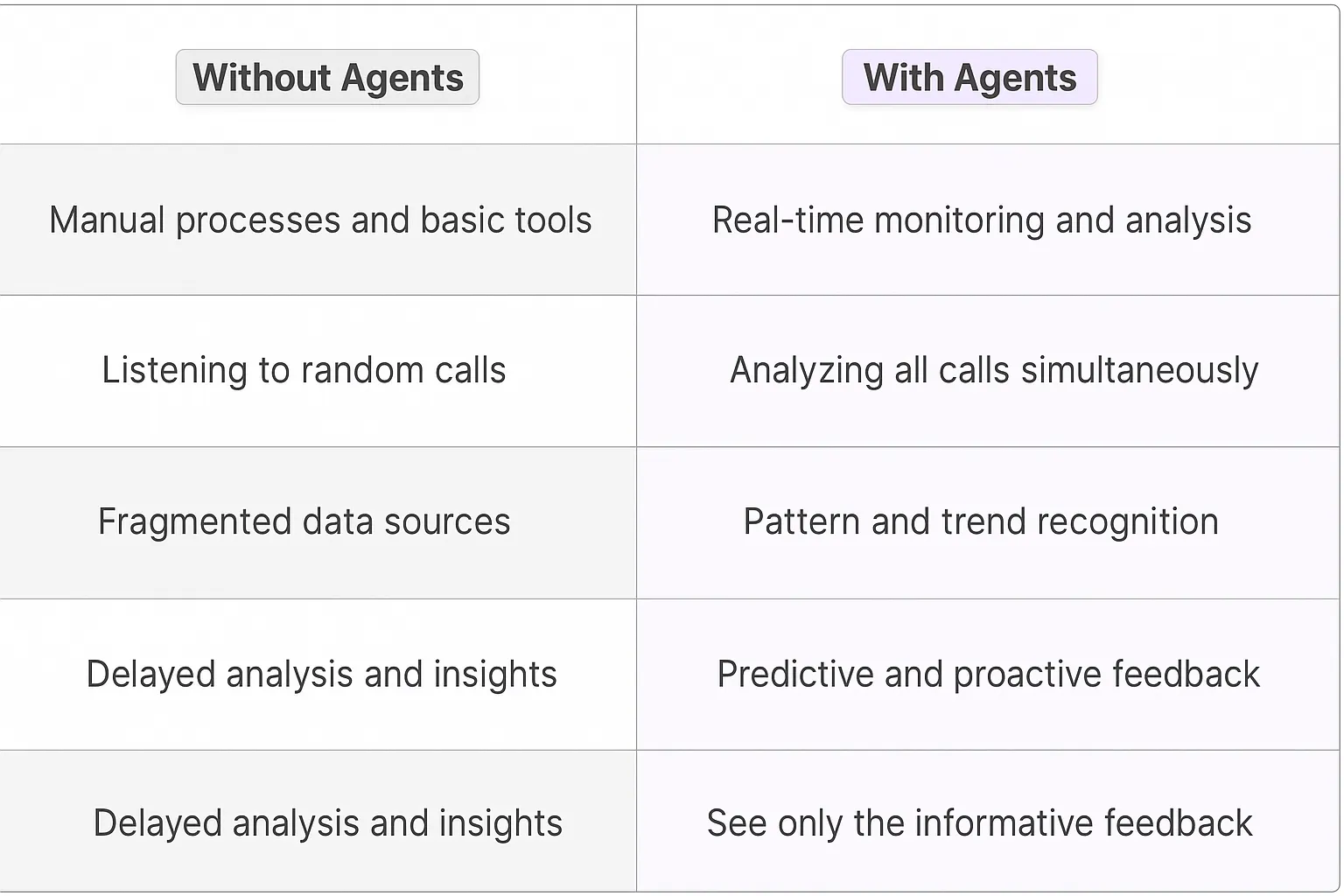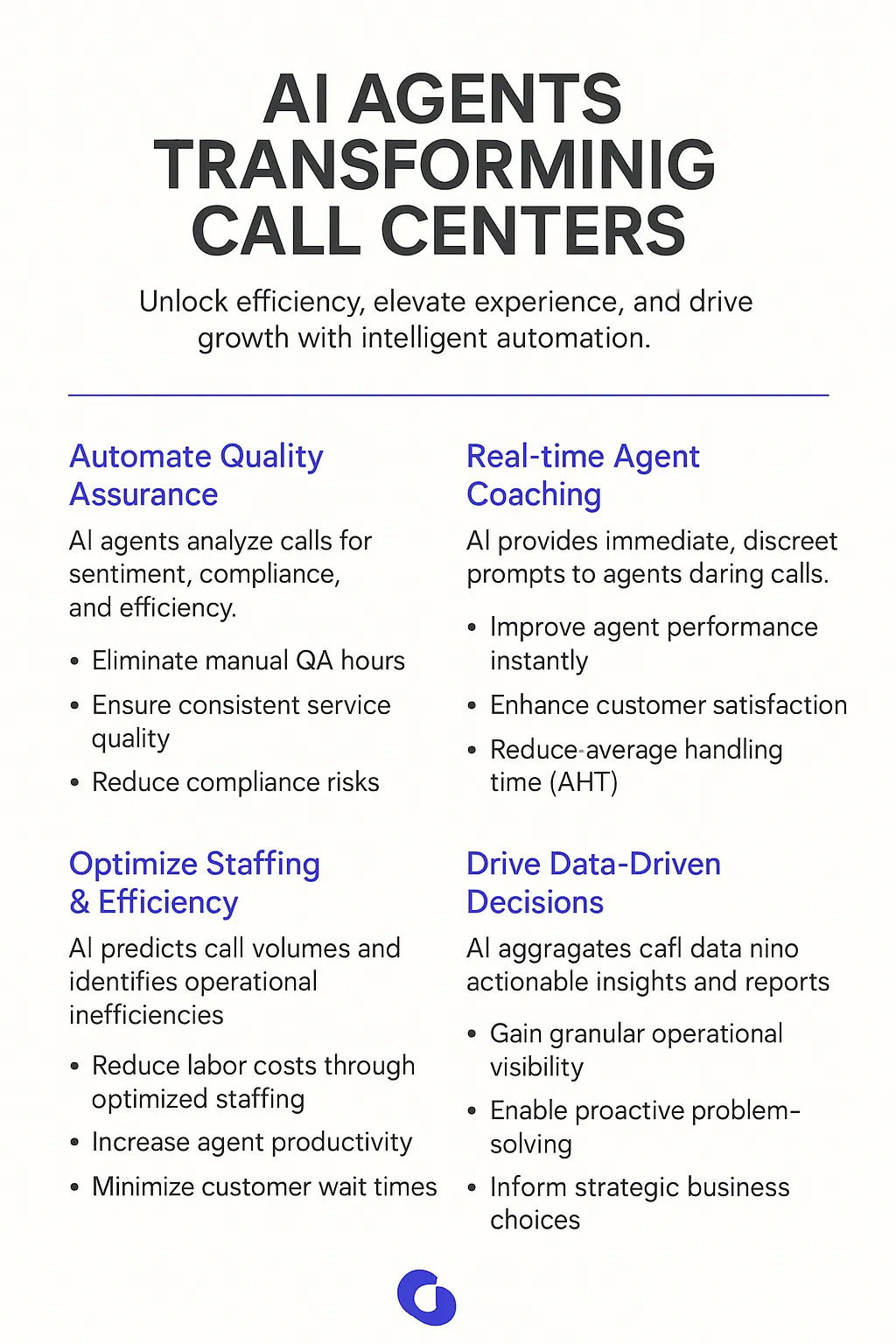Call Center Performance Analysis AI Agents
Understanding Call Center Performance Analysis and AI Agents
What is Call Center Performance Analysis?
Call Center Performance Analysis is the process of evaluating and optimizing the efficiency and effectiveness of a call center's operations. It involves examining various metrics such as call volume, handling time, customer satisfaction scores, and agent performance to identify areas for improvement and implement strategies to enhance overall service quality. Traditionally, this process relied heavily on manual review and basic analytics tools, but the introduction of AI agents has dramatically expanded its scope and capabilities.
Key Features of Call Center Performance Analysis
- Real-time call monitoring and analysis
- Sentiment analysis and emotion detection
- Predictive analytics for call volume and staffing needs
- Automated quality assurance and compliance checks
- Personalized agent coaching and training recommendations
- Advanced pattern recognition for identifying trends and issues
- Integration with CRM and other business systems for comprehensive insights
- Natural language processing for understanding context and intent
- Customizable dashboards and reporting tools

Benefits of AI Agents for Call Center Performance Analysis
Let's dive into the world of call center performance analysis and how AI agents are reshaping this critical business function. As someone who's seen countless tech innovations come and go, I can confidently say that AI in call centers isn't just another fleeting trend – it's a game-changer.
What would have been used before AI Agents?
Traditionally, call centers relied on a mix of manual processes and basic analytics tools. You'd have managers listening in on random calls, poring over spreadsheets, and trying to piece together insights from fragmented data sources. It was like trying to solve a jigsaw puzzle with half the pieces missing and your hands tied behind your back.
Teams would spend hours compiling reports, only to find that by the time they'd identified an issue, it was already too late to act on it. The lag between data collection and actionable insights was killing efficiency and customer satisfaction.
What are the benefits of AI Agents?
Enter AI agents – the digital teammates that are transforming call center operations. These aren't your run-of-the-mill chatbots; we're talking about sophisticated systems that can analyze conversations in real-time, predict customer needs, and provide actionable insights on the fly.
First off, AI agents bring superhuman speed and accuracy to data analysis. They can process thousands of calls simultaneously, identifying patterns and trends that would take human analysts weeks to uncover. This means you're not just reacting to problems – you're anticipating and preventing them before they escalate.
But it's not just about speed. AI agents are learning machines, constantly improving their understanding of customer interactions. They can pick up on subtle cues in tone and language that might slip past even the most attentive human analyst. This deep level of insight allows for hyper-personalized customer experiences and more effective agent training.
One of the most exciting benefits is the real-time coaching capability. AI agents can provide instant feedback to call center reps during live calls, suggesting responses or escalation paths based on the customer's tone and the conversation's direction. It's like having a seasoned pro whispering expert advice in every rep's ear.
From a management perspective, AI agents are a goldmine for strategic decision-making. They can forecast call volumes with uncanny accuracy, helping optimize staffing levels and reduce costs. They can also identify which types of issues are causing the most customer friction, allowing you to proactively address root causes rather than just treating symptoms.
Perhaps most importantly, AI agents are democratizing access to high-level analytics. You no longer need a team of data scientists to extract meaningful insights from your call center data. With user-friendly interfaces and natural language processing, even non-technical team members can ask complex questions and get clear, actionable answers.
The bottom line? AI agents are turning call centers from cost centers into strategic assets. They're not replacing human agents; they're amplifying their capabilities, allowing them to focus on what humans do best – building genuine connections with customers.
As we move forward, the companies that embrace these AI-powered digital teammates will have a significant edge in customer satisfaction, operational efficiency, and ultimately, market share. The future of call center performance analysis isn't just bright – it's brilliant, and it's powered by AI.

Potential Use Cases of AI Agents for Call Center Performance Analysis
Processes
Call center performance analysis is ripe for AI-driven transformation. These digital teammates can dive deep into the vast ocean of call data, surfacing insights that would take humans weeks or months to uncover. They're not just crunching numbers; they're identifying patterns, predicting trends, and suggesting optimizations that can radically improve customer satisfaction and agent efficiency.
One key process where AI agents shine is in real-time call monitoring and feedback. Instead of relying on sporadic human supervision, every single call can be analyzed instantly. The AI can flag issues, suggest interventions, and even provide live coaching to agents. This continuous improvement loop accelerates agent development and ensures consistent service quality.
Another critical process is customer sentiment analysis. AI agents can parse through call transcripts, chat logs, and survey responses to gauge customer emotions and satisfaction levels. This goes beyond simple keyword spotting - these digital teammates can understand context, detect sarcasm, and pick up on subtle cues that might escape human analysts.
Tasks
When it comes to specific tasks, AI agents are game-changers for call center performance analysis. They can:
- Automatically categorize and prioritize calls based on urgency and complexity
- Identify knowledge gaps in the agent team by analyzing frequently escalated issues
- Generate personalized training recommendations for each agent based on their performance metrics
- Predict call volumes and staffing needs with uncanny accuracy, optimizing workforce management
- Detect early warning signs of agent burnout or dissatisfaction, allowing proactive intervention
- Conduct A/B testing on different call scripts or problem-solving approaches, rapidly iterating to find the most effective methods
These AI-powered tasks aren't just incremental improvements - they're foundational shifts in how call centers operate and optimize their performance. The real magic happens when these tasks are combined, creating a synergistic effect that propels call centers into a new era of efficiency and customer satisfaction.
The beauty of AI agents in this space is their ability to learn and adapt. They're not static tools, but evolving partners that get smarter with every interaction. As they ingest more data and receive feedback on their analyses, their insights become sharper, their predictions more accurate, and their recommendations more impactful.
For call center managers, these AI agents are like having a team of tireless, data-driven performance coaches working 24/7. They're not replacing human judgment, but augmenting it with a depth and breadth of analysis that was previously impossible. The result? A call center that's not just reactive, but proactive - anticipating issues, optimizing in real-time, and continuously evolving to meet changing customer needs.
In the end, AI agents for call center performance analysis aren't just tools - they're catalysts for a fundamental reimagining of what a call center can be. They're turning these often-maligned customer touchpoints into strategic assets that can drive customer loyalty, operational efficiency, and ultimately, business growth. The call centers that embrace these AI teammates will find themselves not just keeping up with customer expectations, but setting new standards for what great service looks like in the AI age.

Industry Use Cases
AI agents are reshaping call center performance analysis, offering game-changing capabilities across diverse sectors. Let's dive into some concrete examples that illustrate how these digital teammates are transforming operations and elevating customer experiences in ways we couldn't have imagined just a few years ago.
From finance to healthcare, retail to tech support, AI-powered analysis is uncovering insights that were previously hidden in the noise of daily operations. These aren't just incremental improvements – we're talking about fundamental shifts in how companies understand and optimize their customer interactions.
The following use cases demonstrate the tangible impact of AI in call center performance analysis. They showcase how businesses are leveraging these tools to gain a competitive edge, enhance customer satisfaction, and drive operational efficiency to new heights.
Retail E-commerce: Elevating Customer Support with AI-Powered Call Analysis
The retail e-commerce industry is ripe for disruption when it comes to customer support. Enter Call Center Performance Analysis AI Agents – the secret weapon that's about to change the game for online retailers.
Think about it: e-commerce giants are drowning in customer inquiries. Returns, shipping issues, product questions – it's a never-ending flood. Traditional call centers struggle to keep up, leading to long wait times and frustrated shoppers. This is where AI steps in to save the day (and your sanity).
These AI agents don't just listen to calls; they dissect them. They're like the Sherlock Holmes of customer interactions, picking up on subtle cues that humans might miss. Tone of voice, sentiment, and even the tiniest hints of dissatisfaction – nothing escapes their notice.
Here's where it gets interesting: these digital teammates can analyze patterns across thousands of calls in real-time. They'll spot trending issues before they become full-blown crises. Imagine catching a wave of complaints about a faulty product batch before it turns into a PR nightmare. That's the power we're talking about.
But it's not just about putting out fires. These AI agents are growth hackers in disguise. They'll identify upselling opportunities, pinpoint which scripts convert best, and even suggest personalized responses based on a customer's history and preferences. It's like giving your support team a cheat code for customer satisfaction.
The real magic happens when you combine this analysis with your e-commerce data. Suddenly, you're not just solving problems – you're predicting them. You'll know which products are likely to cause issues, which customers are at risk of churning, and how to tailor your approach for maximum impact.
For e-commerce players, this isn't just an upgrade – it's a complete paradigm shift. We're talking about transforming customer support from a cost center into a strategic asset. It's the difference between playing defense and offense in the cutthroat world of online retail.
The companies that embrace this tech will have a massive edge. They'll resolve issues faster, retain customers better, and ultimately, drive more sales. In an industry where customer experience is everything, Call Center Performance Analysis AI Agents aren't just nice to have – they're the future of staying competitive.
The real game-changer is customer retention. By analyzing call patterns and sentiment, these AI agents can predict which customers are likely to churn and trigger proactive retention campaigns. It's like having a crystal ball for customer loyalty.
Financial Services: AI-Driven Call Analysis Reshapes Customer Relationships
The financial services industry is on the cusp of a major shift in how it handles customer interactions. Call Center Performance Analysis AI Agents are about to flip the script on traditional banking customer service.
Banks and financial institutions deal with a unique set of challenges. They're juggling complex products, strict regulations, and customers who are often stressed about their money. It's a high-stakes environment where a single misstep can cost millions in lost business or regulatory fines.
These AI agents are like having a team of expert analysts listening to every single call. They're picking up on subtle cues that even seasoned reps might miss. Is a high-value client showing signs of dissatisfaction? Is there an uptick in calls about a specific investment product? The AI catches these trends in real-time, allowing banks to be proactive rather than reactive.
But here's where it gets really interesting: these digital teammates can cross-reference call data with a customer's financial history, risk profile, and even market conditions. Suddenly, you're not just solving problems – you're uncovering opportunities. Imagine an AI flagging a customer who's perfect for a new investment product based on their recent inquiries and financial behavior. That's next-level personalization.
The compliance monitoring angle is huge here. In an industry drowning in regulations, these AI agents act as a constant audit system. They can flag potential compliance issues in real-time, saving banks from costly fines and reputation damage. It's like having a compliance officer listening to every single call, 24/7.
For fintech startups, this tech is a game-changer. They can punch above their weight, offering personalized service that rivals or exceeds traditional banks, all with a fraction of the staff. It's a classic example of technology as a force multiplier.
The banks that adopt this technology will create a flywheel effect. Better service leads to higher customer satisfaction, which leads to more deposits and investments, which in turn allows for better products and services. It's a virtuous cycle that could reshape the competitive landscape.
We're not just talking about incremental improvements here. This is about fundamentally changing the relationship between financial institutions and their customers. It's turning every interaction into an opportunity for deeper engagement and value creation.
In the world of financial services, where trust is currency, Call Center Performance Analysis AI Agents aren't just a tool – they're the key to building and maintaining that trust at scale. The institutions that get this right will dominate the next era of banking.
The impact on call center managers is particularly significant, as they can now oversee operations with unprecedented visibility and control.
Considerations
Technical Challenges
Implementing a Call Center Performance Analysis AI Agent isn't a walk in the park. It's more like trying to teach a robot to understand the nuances of human conversation while juggling flaming chainsaws. First off, you're dealing with speech recognition in a noisy environment. Think about it: background chatter, keyboard clacking, and the occasional frustrated sigh – all of these can throw a wrench in the works.
Then there's the matter of natural language processing. Your AI needs to not just hear words, but understand context, tone, and intent. It's the difference between a customer saying "This is great!" sincerely and sarcastically. Humans get it instantly; machines? Not so much.
Data integration is another beast altogether. Your AI agent needs to pull information from multiple sources – CRM systems, call logs, customer history – and make sense of it all in real-time. It's like asking someone to read War and Peace, solve differential equations, and juggle at the same time.
Operational Challenges
On the operational side, you're essentially asking your call center to adopt a digital teammate. This isn't just a new tool; it's a paradigm shift. You'll face resistance from employees who fear being replaced by AI. It's crucial to frame the AI agent as an enhancer of human capabilities, not a replacement.
Training is another hurdle. Your team needs to learn how to work alongside this AI, interpret its insights, and know when to trust its judgment versus their own instincts. It's like teaching a team of seasoned chefs to cook with a futuristic kitchen that can predict flavors – exciting, but potentially disorienting.
Privacy and compliance issues can't be overlooked. Your AI will be handling sensitive customer data, so you need robust security measures and clear guidelines on data usage. One misstep here, and you're looking at a PR nightmare and potential legal ramifications.
Lastly, there's the challenge of continuous improvement. AI isn't a set-it-and-forget-it solution. It needs constant fine-tuning based on new data and changing business needs. You're essentially signing up for a never-ending process of optimization. It's like trying to hit a moving target while riding a unicycle – on a tightrope.
Transforming Customer Service with AI: The Future of Call Centers
Call Center Performance Analysis AI Agents are not just another tech fad – they're a fundamental shift in how businesses approach customer service. These digital teammates are turning call centers from reactive problem-solvers into proactive value creators. They're democratizing access to high-level analytics, allowing even smaller players to compete with industry giants in terms of service quality and efficiency.
The impact goes beyond just improving metrics. We're talking about reshaping customer relationships, uncovering new business opportunities, and creating a feedback loop that continuously enhances products and services. For businesses willing to embrace this technology, the potential for growth and competitive advantage is enormous.
However, it's crucial to approach implementation with eyes wide open. The technical and operational challenges are significant, and success requires a commitment to ongoing learning and adaptation. But for those who get it right, the rewards are transformative. In the evolving landscape of customer service, Call Center Performance Analysis AI Agents aren't just a nice-to-have – they're becoming a must-have for any business serious about staying ahead of the curve.
The focus on customer service quality and performance analytics will continue to drive innovation in this space, making these AI agents indispensable tools for modern call centers.













